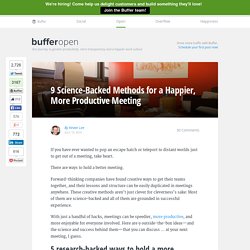

9 Science-Backed Methods for a Happier, More Productive Meeting. If you have ever wanted to pop an escape hatch or teleport to distant worlds just to get out of a meeting, take heart.

There are ways to hold a better meeting. Forward-thinking companies have found creative ways to get their teams together, and their lessons and structure can be easily duplicated in meetings anywhere. These creative methods aren’t just clever for cleverness’s sake: Most of them are science-backed and all of them are grounded in successful experience. With just a handful of hacks, meetings can be speedier, more productive, and more enjoyable for everyone involved. Here are 9 outside-the-box ideas—and the science and success behind them—that you can discuss … at your next meeting, I guess. 5 research-backed ways to hold a more productive meeting 1. What’s your record for longest meeting? Can anyone beat my four-hour marathon? When it comes to meeting pain points, length often tops the list. Work expands to the time you schedule for it. 2. Set a 30 minute timer. 3. 4. 5. 1. 2. 37 Ways to Be Happier at Work ASAP.
We’ve all read advice on how to be more efficient and harder working in the office.

Productivity tends to be the name of the game when it comes to professional improvement. But ultimately, our mental health is just as important as the documents we draft and the spreadsheets we email out. So, how do we effectively walk the line between being professionally productive and personally happy? Check out these 37 ways to be happier at the office—from things you can do right now to things you should implement in the next year for long-term well-being. (You—and your boss—can thank us later.) Right Now 1. If you don’t love the things on the to-do list in front of you, try incentivizing yourself with basic bribery.
Redirect?url=http%3A%2F%2Ft. One of the most unchanged elements of our life today is our optimal work time or how long we should work – generally, every person I’ve spoken to quotes me something close to 8 hours a day.

And data seems to confirm that: The average American works 8.8 hours every day. At least, those are the official statistics from the Bureau of Labor Statistics: And yet, for most of us it is obvious that knowing how long the average person works every day has little to do with how efficient or productive that pattern is. At least, that is what I personally found for my own productivity. So what’s the the right hourly rate? With success stories from people working 4 hours a week, to 16 hours a day, it’s hard to know if there is an optimal amount.
Share stories like this to your social media followers when they’re most likely to click, favorite, and reply! Why do we have 8 hour work days in the first place? Let’s start out with what we have right now. Working remotely & Getting things done. 4) Keep on Learning “You need to read this book!

…” If Warren Buffet can still make time to read, I figure I can do that too, especially when engaging in those longer commutes. My colleagues love to read, they always have great recommendations, When I find something interesting, I go ahead and YouTube proof it: Do I enjoy this topic enough to spend 5–10 hours reading about it? Speed-watching a video (2x speed) on the topic helps me find out, Ok, that’s my kind of book! Kindle reading is awesome! Equally awesome, I recently got addicted to Audible.com: How to Scale Yourself and Get More Done Than You Thought Possible.
The following is a detailed write-up of a popular productivity talk delivered by Scott Hanselman.

Visit his blog, hanselman.com, for more productivity tips. "Don't worry, just drop the ball. " This counterintuitive advice is one of a dozen-plus productivity practices preached by Scott Hanselman, a program manager at Microsoft, author and avid blogger and speaker. "Dropping the ball is sometimes the right answer," Hanselman says. "Let a ball drop. Hanselman's not the person you'd to expect to hear encourage dropping the ball and discourage burning the midnight oil. How does he do it? "A lot of people say, 'Well, Scott, you're doing all this stuff. "It turns out," he continues, "the less that you do, the more of it that you can do. Scale Yourself In a 40-minute talk Hanselman originally delivered in 2012, and has since presented several times—most recently at South by Southwest Interactive earlier this month—he shares his productivity practices.
Look for Danger Signs Define "Work" Drop the Ball.